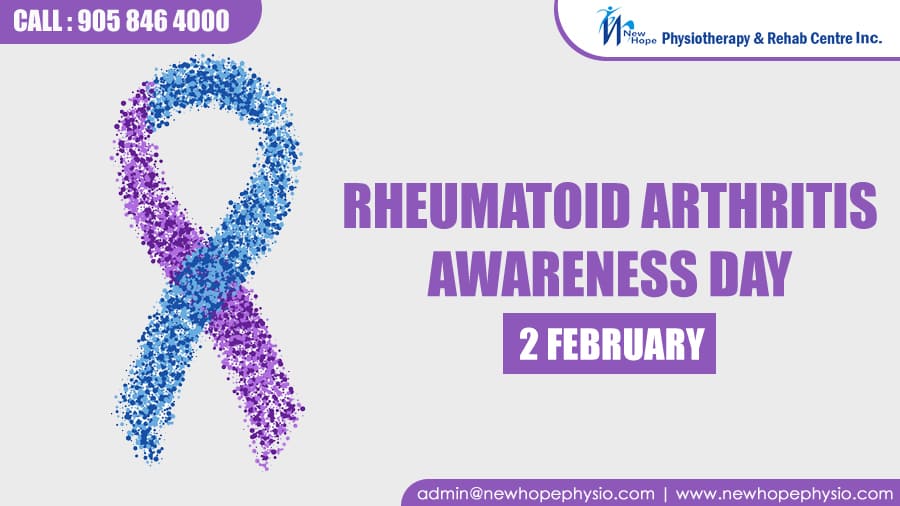
Welcome to New Hope Physiotherapy
- Brampton 905-846-4000
- Malton 905-364-3900
- Orangeville 519-217-9300
- admin@newhopephysio.com
- Home
- Blog
Rheumatoid Arthritis Awareness Day 2023 : Theme, Activities, History
 31 Jan 2023
31 Jan 2023
- Comments
- 1326
Rheumatoid Arthritis Awareness Day 2023 : Theme, Activities, History
Rheumatoid Arthritis Awareness Day is a time to shed light on a debilitating condition that affects millions of people around the world. In recognition of Rheumatoid Arthritis Awareness Week 2023, it’s important to educate others about the condition and support those living with it.
History of Rheumatoid Awareness Day
Previously assumed to be osteoarthritis, the illness known as “rheumatoid arthritis” was discovered and given that name by English physician Sir Alfred B. Garrod in 1858. Garrod made the distinctions between rheumatoid arthritis and osteoarthritis.
Patients with rheumatoid arthritis got together to form the Rheumatoid Patient Foundation, established in 2011. The organization’s mission is to increase public awareness of rheumatoid arthritis and its treatment alternatives. The Rheumatoid Patient Foundation established “Rheumatoid Awareness Day” in 2013 to raise awareness of the disease and dispel common misconceptions.
Rheumatoid Arthritis Awareness week 2023 Facts
- Rheumatoid arthritis is a disorder that affects a large population of people worldwide. R.A. affects more than 1.5 million people in the United States alone.
- Compared to men, women are more prone to developing rheumatoid arthritis. This disease is diagnosed in women 2.5 times more frequently than in males worldwide.
- People between the ages of 20 and 50 are the most susceptible to this illness.
- There are more than 350 million Rheumatoid Arthritis patients worldwide.
- Among those who have rheumatoid arthritis, race also has an impact. Multiracial groups, persons of colour, non-Hispanic whites, and Hispanics are the groups that have been reported to have increased risks of the arthritis-related activity.
Also Read : World Arthritis Day (WAD) 2023 : Activities, Theme, Quotes
Rheumatoid Awareness Day 2023: How to Celebrate It?
You can perform several things to observe World Rheumatoid Arthritis Day, including;
Create health fairs to identify the disease and raise awareness. You could volunteer at the health camp to increase your understanding of the illness. You can also participate in a campaign where you ask members of your neighbourhood to sign up for this Rheumatoid Disease Awareness Day.
- To identify R.A., organise a medical camp. You may start a campaign and ask members in your neighbourhood to participate. You can still help by volunteering at a medical camp if you need help to complete everything.
• Publish information on social media. If a Google search is unsuccessful, foundations like R.P.F. would have the necessary data and statistics. - On this Rheumatoid Arthritis Awareness, week 2023, learn about the illness and how to control it. You can only raise awareness of the disease if you are well informed. As a result, the first step in raising awareness is to educate yourself. This will enable you to share the knowledge with others.
Therefore, we bring you everything about Rheumatoid arthritis (R.A.). Keep reading!
Also Read : World Physical Therapy / Physiotherapy Day 2024
What is Rheumatoid arthritis?
Rheumatoid arthritis (R.A.) is a chronic autoimmune disease that causes inflammation of the joints and surrounding tissues. It is characterized by symmetrical joint swelling, pain, and stiffness, typically in the hands, feet, wrists, elbows, knees, and ankles.
Over time, the inflammation can cause permanent damage to the joints and other parts of the body, including the skin, eyes, lungs, heart, and blood vessels.
R.A. is a progressive disease that can lead to disability if left untreated. It affects approximately 1% of the global population, with women being three times more likely to develop R.A. than men.
The exact cause of R.A. is unknown, but it is thought to be a combination of genetic and environmental factors.
There is no cure for R.A., but treatments can help manage the symptoms and prevent joint damage, including nonsteroidal anti-inflammatory drugs (NSAIDs), disease-modifying antirheumatic drugs (DMARDs), and biologic agents. Early diagnosis and treatment of R.A. are important for preventing long-term joint damage and disability.
Symptoms and diagnosis of Rheumatoid arthritis
Rheumatoid arthritis (R.A.) is a chronic autoimmune disease that causes inflammation in the joints, leading to pain, stiffness, and, eventually, joint damage.
Here are some of the common symptoms and diagnoses of R.A.:
Symptoms:
- Pain and swelling in multiple joints, particularly in the hands and feet
- Stiffness, especially in the mornings or after sitting for long periods
- Fatigue
- Loss of joint function and mobility
- Bumps under the skin near joints (rheumatoid nodules)
Diagnosis:
- Physical exam: The doctor will check for joint swelling, redness, warmth, and tenderness.
- Blood tests: Erythrocyte sedimentation rate (E.S.R.) and C-reactive protein (C.R.P.) are checked to look for signs of inflammation.
- Rheumatoid factor (R.F.) test: A blood test to determine if the patient has high levels of R.F., a protein commonly found in people with R.A.
- X-rays and imaging: X-rays and other imaging tests, such as M.R.I. or ultrasound, can help show the extent of joint damage and track the progression of the disease.
If you are experiencing symptoms of R.A., you must see a rheumatologist for a proper diagnosis. Early diagnosis and treatment can help prevent joint damage and improve outcomes. Treatment options include medication, physical therapy, and surgery in severe cases.
Causes and risk factors of Rheumatoid arthritis
Rheumatoid arthritis (R.A.) is a chronic autoimmune disease that causes inflammation and joint pain. The exact cause of R.A. is unknown, but a combination of genetic and environmental factors can increase a person’s risk of developing the condition.
Some of the risk factors for R.A. include:
- Age: R.A. can occur at any age, but it is most common in people between the ages of 40 and 60.
- Gender: Women are more likely to develop R.A. than men.
- Family history: If someone in your family has R.A., you are more likely to develop the condition.
- Smoking: Smoking can increase the risk of R.A., especially in women.
- Obesity: People who are overweight or obese are at higher risk of developing R.A.
- Infections: Some infections, such as bacteria or viruses, can trigger R.A.
- Hormonal changes can affect the immune system and increase the risk of R.A.
It’s important to understand that while these factors may increase the likelihood of developing R.A., they do not guarantee that a person will develop the condition.
It’s important to talk to a doctor if you have concerns or symptoms of R.A., as early diagnosis and treatment can help reduce the impact of the disease on your life.
Also Read : 36 questions should I ask a Physiotherapist?
Conventional treatments (such as medication and physical therapy)
Conventional treatments for physical conditions include medications and physical therapy. Medications can include pain relievers, anti-inflammatory drugs, muscle relaxants, and other drugs designed to relieve symptoms of physical conditions.
Physical therapy involves exercises, stretches, and other treatments designed to improve mobility, reduce pain, and increase strength. It can also include equipment such as heat therapy, ice therapy, and electrical stimulation to help improve the function of the affected area.
Physical therapy is often recommended as a first-line treatment for many physical conditions. It is considered one of the most effective ways to manage symptoms and improve overall health.
One of the best physical therapy clinics in New Hope Physiotherapy Clinic. They offer a wide range of services and treatments tailored to meet their patients’ individual needs. They use the latest technology and techniques to help patients achieve their goals and improve their quality of life.
If you are looking for a high-quality Physiotherapy clinic in Brampton that can help you manage your physical condition and improve your health, New Hope Physiotherapy Clinic is a great choice. Their team of experienced and knowledgeable therapists will work with you to develop a personalized treatment plan designed to help you reach your goals and achieve the best possible outcomes.
Also Read : Why do we commemorate World Physiotherapy Day?
Advancements in Rheumatoid Arthritis (R.A.) research and treatment
Advancements in R.A. research and treatment have greatly improved the quality of life for individuals with this condition.
One of the biggest advances has been the development of biological drugs such as tumor necrosis factor (TNF) inhibitors and interleukin-6 (IL-6) inhibitors. These drugs target specific components of the immune system that contribute to R.A. symptoms and can slow down or even stop joint damage.
Early diagnosis and treatment are now emphasized to prevent joint damage and improve outcomes. This can be done through imaging techniques such as ultrasound or M.R.I., which allow for earlier and more accurate diagnosis.
Rehabilitation and physical therapy are also becoming increasingly important in managing R.A. Exercise and physical therapy can help improve joint mobility, muscle strength, and overall function. Additionally, weight management and smoking cessation can also have a positive impact on R.A.’s symptoms.
In addition to these advancements, there has also been increased research into the genetics of R.A., which may lead to new, personalized treatment options. With continued research and advancements, individuals with R.A. can look forward to better treatment options and a better quality of life.
Coping with Rheumatoid Arthritis (R.A.)
Rheumatoid Arthritis (R.A.) is a chronic autoimmune condition that affects the joints and can cause inflammation and pain. Coping with R.A. can be challenging, but some steps can help manage the symptoms.
Here are a few tips for coping with R.A.:
- Exercise regularly: Gentle exercise can help improve mobility and reduce pain in affected joints.
- Eat a healthy diet: A balanced diet can help reduce inflammation and improve overall health.
- Manage stress: Stress can exacerbate R.A. symptoms, so finding ways to manage stress is important.
- Get enough rest: Getting adequate sleep and rest is important for overall health and can help reduce R.A. symptoms.
Rheumatoid Awareness Day 2023 is an opportunity to raise awareness about the impact of R.A. on those affected and support research to find a cure. New Hope Physiotherapy Clinic provides a wide range of physiotherapy services for patients with R.A. and other joint-related conditions. The clinic’s experienced therapists can help patients improve joint mobility, reduce pain and stiffness, and increase physical function.
Living with R.A. can be challenging, but with the right tools and support, it is possible to manage its symptoms and maintain a good quality of life.
Also Read : When is World Physical Therapy Day Observed?
Final Words
R.A. Awareness Day is being celebrated globally to raise awareness about the condition. This day aims to educate the public about the signs and symptoms of rheumatoid arthritis and the available treatments and support systems.
National Rheumatoid Arthritis Day and Rheumatoid Arthritis Awareness Day 2023 are important opportunities to come together as a community and show support for those affected by the condition. There are many ways to get involved and show support, including donating to a rheumatoid arthritis organization, participating in a fundraiser, or simply spreading the word about the condition.
In addition to raising awareness, World Rheumatoid Arthritis Day 2023 is also an opportunity to advocate for better treatment options and improved access to care. With proper treatment and support, those with rheumatoid arthritis can lead fulfilling lives and manage their symptoms effectively.
In conclusion, Rheumatoid Arthritis Awareness Day 2023 is a time to unite and support those affected by this debilitating condition. Let us spread the word about rheumatoid arthritis and show our support for those living with it.
New Hope Physiotherapy Clinic: Support and resources for individuals with R.A.
New Hope Physiotherapy Clinic is a leading provider of physiotherapy services for individuals with R.A. They offer a range of treatment options, including manual therapy, exercise prescription, and modalities such as ultrasound and heat therapy.
Their experienced therapists trained to work with individuals with R.A. to develop personalized treatment plans to meet their specific needs and goals.
In addition to physiotherapy, individuals with R.A. may benefit from support groups, education on managing their condition, and access to assistive devices such as braces and canes.
With the proper support and resources, individuals with R.A. can improve their quality of life and maintain their independence.
Join us in marking Rheumatoid Arthritis Day 2023 by taking control of your health and well-being with the help of our experienced physiotherapists at New Hope Physiotherapy Clinic.
Let us support you in managing your symptoms and improving your quality of life with personalized treatment plans and cutting-edge techniques. Book your appointment today and start your journey to a pain-free future.
Tags:
- History of Rheumatoid Awareness Day,
- National Rheumatoid Arthritis Day,
- Rheumatoid Arthritis,
- Rheumatoid Arthritis Awareness Day,
- Rheumatoid Arthritis Awareness Day 2023,
- Rheumatoid Arthritis Awareness Week,
- Rheumatoid Arthritis Awareness Week 2023,
- Rheumatoid Arthritis Awareness week 2023 Facts,
- Rheumatoid Arthritis Awareness week 2023 Theme,
- Rheumatoid Awareness Day,
- Rheumatoid Awareness Day 2023,
- What is Rheumatoid arthritis,
- World Rheumatoid Arthritis Day,
- World Rheumatoid Arthritis Day 2023,
Recent Posts
All Categories
- Acupuncture
- Arthritis
- Back Pain
- Chiropractic
- Chronic Pain
- Cupping Therapy
- Exercise
- Fibromyalgia
- Hamstring Pain
- Headaches
- Health
- Injury Clinic
- Joint Pain
- K Taping Therapy
- Knee pain
- Laser Therapy
- Manual Therapy
- Massage Therapist
- Massage Therapy
- Mental Health
- Motor Vehicle Accident
- Neck Pain
- Nerve pain
- Orthotics
- pelvic floor physiotherapy
- Physiotherapy
- Sciatica Pain
- Scoliosis Exercises
- Shockwave Therapy
- Shoulder pain
- Sports Physiotherapy
- VRT
- 905-846-4000
- 905.846.2100
- Kennedy Road & Sandalwood Road Unit#1, 170 Sandalwood Prky East Brampton, ON. L6Z 1Y5
MALTON
- 905-364-3900
- 905.676.9499
- Airport Road & Drew Road Unit# 139, 2960 Drew Rd. Mississauga, ON L4T 0A5
ORANGEVILLE
- 519-217-9300
- 519.217.9588
- Hwy 9 & Rolling Hills Drive Unit #4 , 50 Rolling Hills Drive Orangeville, ON L9W 4W2



Leave a Comment